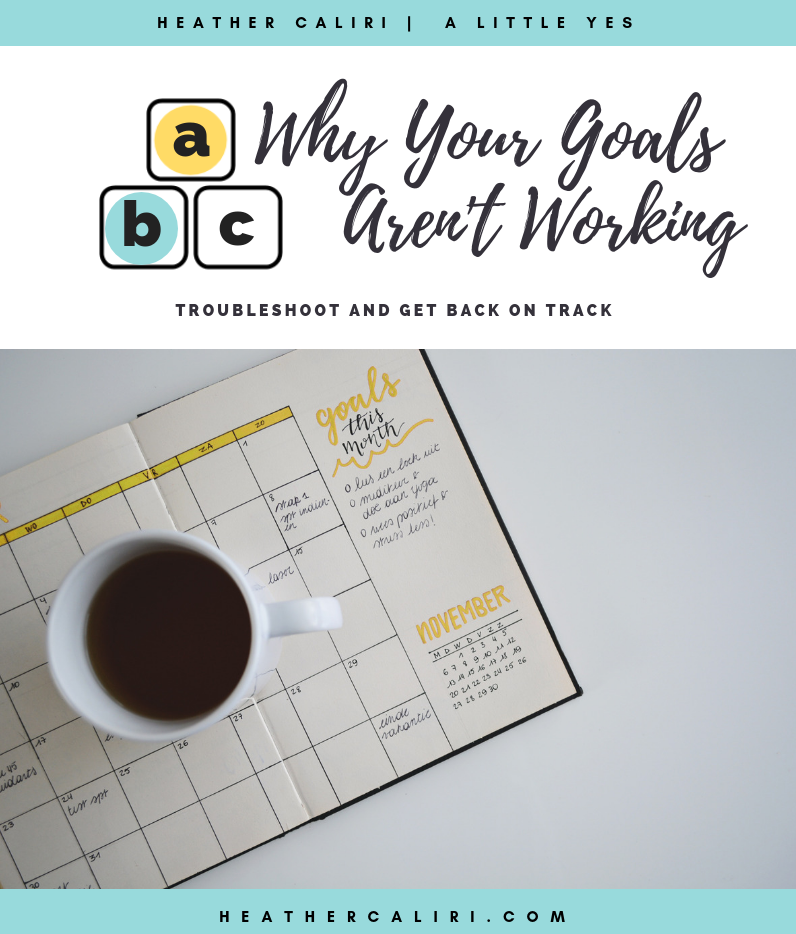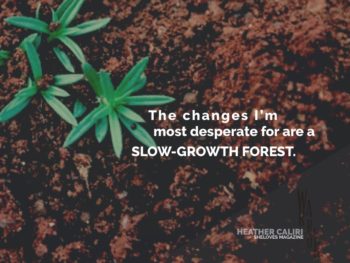
I used to think goals were like rock climbing, or more specifically, like those tiny little plastic handholds in an indoor climbing gym. When I set goals, it was like choosing, with zero understanding, the shape and size of each grip, as well as their placement on a sheer cliff face. Once they were installed, I was transported thirty feet up in the air, extremely committed to the course I’d set. Each goal was the launching point for the next scary reach. Each goal required me to lunge up into empty space and clutch at a tiny protrusion. If I’d misjudged how far apart to put the grips, too bad—there was no changing anything now. It required all of my strength, balance, strategy and bravery to not slip and fall to my death.
Unlike rock climbing, there was no rope, no belay, no team work. It was just me, the tiny grips, and a lot of anxious willpower.
Honestly, it’s no wonder I hesitated to set goals. Goals sounded terrifying.
But what if there were another story we could tell ourselves about goals? In fact, what if there were infinite stories we could tell, infinite ways we could set goals, make them work for us, and use them to enrich our lives?
Here’s one: a goal is a trip you plan to a city you’ve always longed to visit. It allows you to save up the money, carefully make travel arrangements, and remember all the delicious landmarks and food you want to experience while you’re there. Once you do all those things, the goals get you home for a good rest.
Or: a goal is the daily walk you take every afternoon when the sun sets. You wander through a neighborhood you love and say hi to people who have come to recognize you and ask after your dog.
Or: a goal is one of those handy multipurpose tools you keep in a drawer for tricky projects. When you pull it out, you’re astonished at how well-engineered it is to assist you.
Or: a goal is like a kindly personal assistant who knocks politely on your door, reminding you of your important meetings and tasks for the day, then brings you a cup of tea and tells you what good work you’re doing.
Or: a goal is like a personal mission statement you made for yourself and cross-stitched in gorgeous jewel tones. When you see it on your wall, you’re inspired to live more closely aligned with your values, with joy and anticipation.
Or: a goal is like a kid who comes to your computer and tells you you’ve been working too long. They tug on your hand and remind you that a game of Clue is much more important than answering the next email.
All of these stories could be true of a particular goal, or you could make up your own. The point is, the goal is not what’s important, or in control. You are.
Any particular goal could work in multiple ways, helping you feel like the person you long to be: focused, joyful, brave, rested, connected, eager. Goals are not external markers that force you to comply—they’rean internal tool that you can adjust and tinker with until they’re a good fit for your temperament and desire. They can offer as much or as a little guidance as you want. They can be a simple commitment to a new, joyful habit (I will keep my kitchen sink clean for a week a la Flylady) or a complex, brave system of interconnected commitments and tasks (I will finish my book manuscript and pitch it to agents by January 1).
It bears repeating: goals do not control you—you are in charge.
If goals “haven’t worked for you” in the past, I would ask: what kind of goals? What stories did you tell yourself about them? Did you leave your humanity and emotions at the door when you planned them? Were you actually eager for the end result? Were you realistic about the difficulty of completing them? Did you allow yourself space to change the goal to fit your circumstances? Did you your first goal thrust you into skills you were unprepared for? Did you shame yourself when you slipped up?
If goals frighten you, you probably have good reason for feeling that way. Our culture is full of anxiety, workaholism, punitive attitudes towards failure, and a lot of numbness about trauma and pain. If you’ve been driven hard by something or someone in your life, you might shy away from goals like an abused kid flinches when a loved one reaches for them. If goals feel overwhelming, horrible, or off-putting, can I just give you permission right now to say no to them? Tell yourself that it’s okay to NOT set goals, make resolutions, plan your future. That you have good reason, and you’re not ready.
Congratulations—you just set a goal to not do goals. It’s an important one, and the basis of all other brave steps forwards.
The baseline rule about goals is this: if they make you feel like crap, then stop them. Quit. Be done. The whole point of goals is to become more acquainted with your tender heart, your yearnings, your coltish, skittish desire to run. Forcing yourself to ignore your misgivings is a bad way to begin.
So if you read this and think I’m not ready, own that. Love that clarity and that honesty from yourself. Wait until the idea of a goal—a desire to try a new habit, or to make an “enough list”, or to take a painting class, or go dancing again seizes you and won’t let you go. Then, when it’s delicious and inviting and curiosity-driven, go for it.
Because goals are tools, not vows. They should bless you, not stress you out. If they hurt you, the goals are at fault, not you. You can let them go, knowing that a better tool is out there. Knowing that you’re enough, right now. Knowing that when the time is right, God can help you take the next step forwards towards joy.
Need practical help troubleshooting your goals? I put together a list of why your goals might go south–and what to do about it. Grab it here.

Photo by Victor Xok on Unsplash














 A Little Yes Live: Goals that Nurture Your Inner Toddler
A Little Yes Live: Goals that Nurture Your Inner Toddler